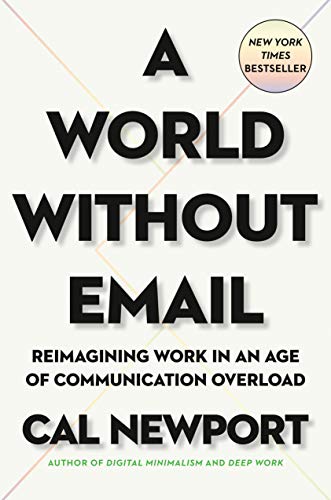A World Without Email: Reimagining Work in an Age of Communication Overload Link to heading
Summary: Link to heading
“A World Without Email: Reimagining Work in an Age of Communication Overload” by Cal Newport explores the overwhelming impact of email and instant messaging on modern work culture. Newport argues that the current reliance on constant communication tools impedes productivity, creativity, and job satisfaction. He proposes a reevaluation of work processes, advocating for systems that minimize unscheduled communication and maximize deep, focused work. The book delves into the historical context of email’s rise and assesses alternative strategies that can reduce the communication overload faced by workers today.
Review: Link to heading
Cal Newport’s “A World Without Email” is a thought-provoking analysis of modern work habits, delving deeply into how incessant digital communication detracts from meaningful output. Newport’s meticulous research and compelling arguments effectively highlight the dysfunctions of current work environments. One of the book’s strengths is its practical approach, offering tangible strategies and examples from organizations that have successfully reduced their dependency on email. However, some critics argue that Newport’s ideas may not be universally applicable, especially in industries that require real-time communication. Nonetheless, the book is an impactful contribution to discussions on productivity and work culture.
Key Takeaways: Link to heading
- Focus on Deep Work: Prioritize uninterrupted, focused work sessions over responding to constant communication requests.
- Process Redesign: Implement workflow strategies that lessen the need for back-and-forth messaging, such as predefined communication protocols.
- Task Boards and Shared Documents: Use tools that allow asynchronous work updates, reducing email dependency.
- Reduce the Hyperactive Hive Mind: Address the tendency of relying on instant communication for decisions that can be made through structured processes.
- Encourage Autonomy in Communication: Empower teams to decide the best communication methods for their tasks, rather than defaulting to email.
Recommendation: Link to heading
“A World Without Email” is highly recommended for professionals, managers, and organizational leaders who are interested in improving productivity and reducing work stress. It’s particularly beneficial for those looking to implement more efficient communication strategies and reevaluate workplace culture to enhance job satisfaction and output quality. The book provides valuable insights for anyone feeling overwhelmed by the constant barrage of digital communication.
